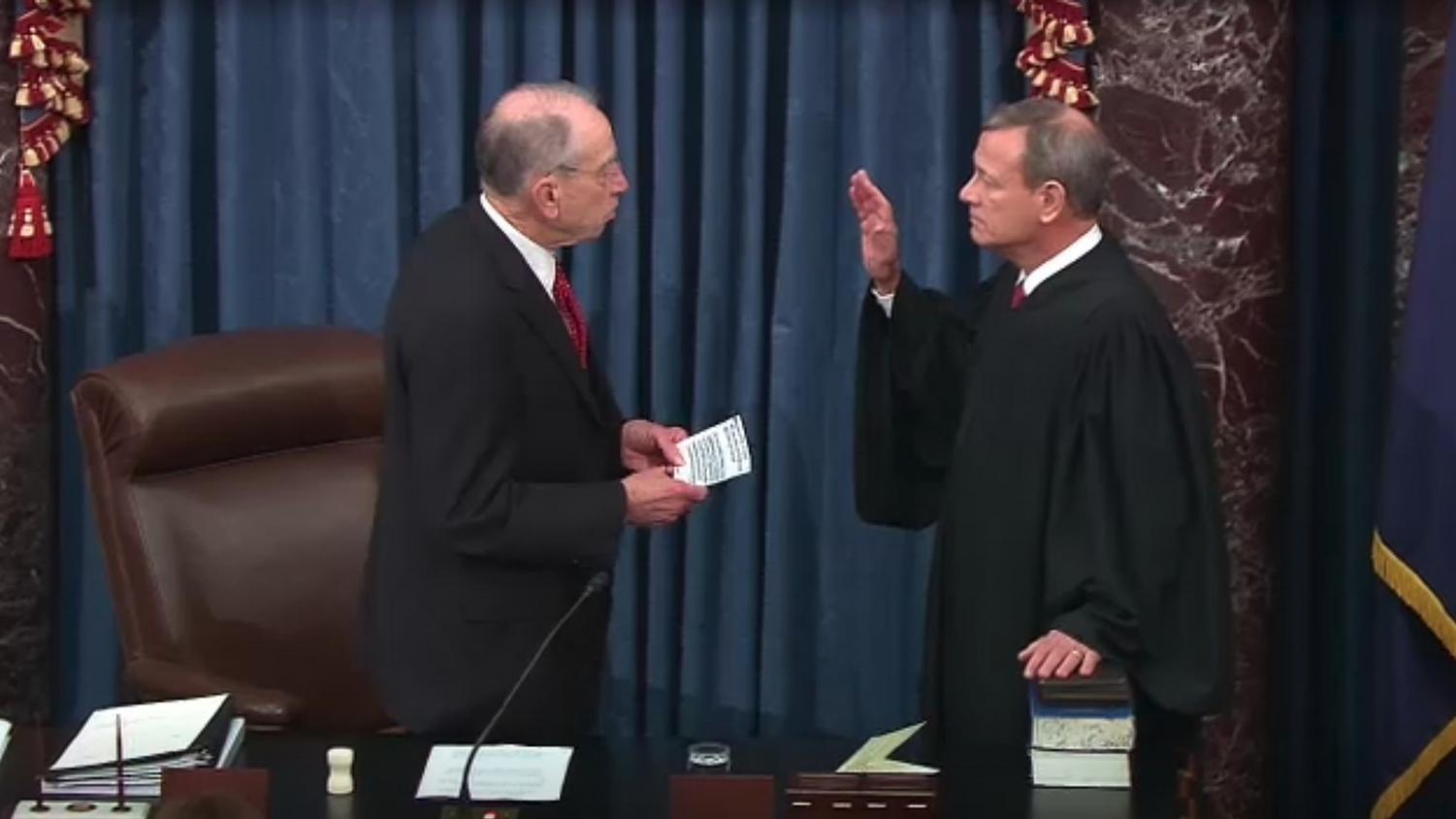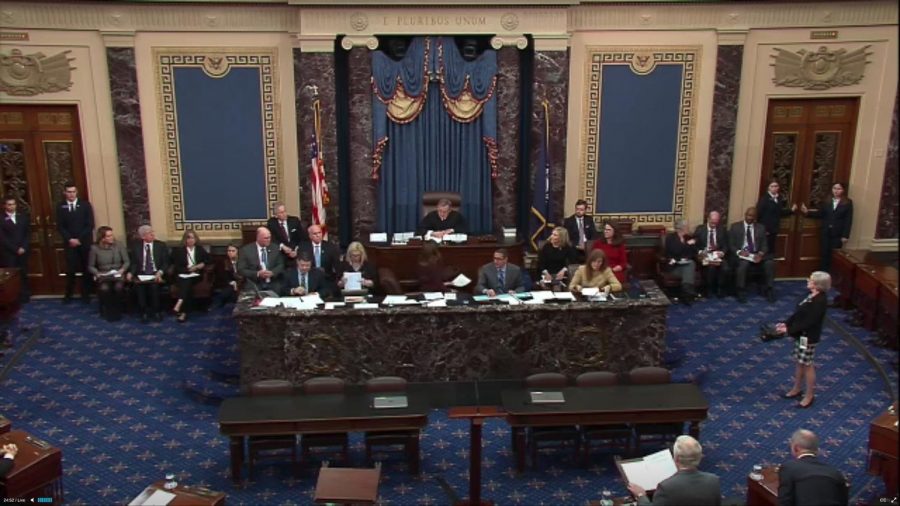Trump’s impeachment: what’s happened and what’s to come
Photo via Wikimedia Commons under Creative Commons license
Chief Justice, John Roberts, begins the impeachment trial of President Donald Trump
January 17, 2020
On December 18th, 2019, the House of Representatives approved articles of impeachment against the 45th president of the United States, Donald Trump, and now, a month later, the trial has reached the Senate floor.
So what exactly does impeachment mean? According to Del Val’s Advanced Placement Government and Politics teacher, Ted Manner, “It means to call into question; to investigate a particular controversy or issue.”
The official impeachment proceedings began back in September, after an anonymous whistleblower informed the House Intelligence Committee of a July phone call between President Trump and Ukrainian President Volodymyr Zelensky, during which Trump had been accused of withholding military aid in exchange for harmful information concerning his rival in the 2020 election, Joe Biden, and Biden’s son.
Impeachment means to call into question; to investigate a particular controversy or issue
— Ted Manner
While there is little dispute over the actual transcript of the call, and the $400 million worth of aid held from Ukraine, there is controversy over whether or not Trump’s actions were a violation of Article II of the Constitution (which establishes the limits facing the executive branch.) However, the specific actions that constitute as impeachable offenses under the Constitution are up to interpretation. “That’s entirely what the Framers intended. It’s supposed to be a political process,” Manner said.
Proponents of the impeachment argue that seeking help from a foreign country to investigate a political rival is beyond the scope of a president’s powers, while those who support the president claim the call was nothing more than an investigation into corruption and, therefore, warranted.
On October 31st, the House voted to continue the inquiry and later approved two articles of impeachment against Trump: abuse of power and obstruction of justice. At 5 p.m. on Wednesday January 15, the articles were walked to the Senate, a ceremony reserved for the occasion. Only two presidents preceding Trump had been formally impeached by the House and put on trial in the Senate: Andrew Johnson and Bill Clinton. (Richard Nixon resigned after the Judiciary Committee’s impeachment inquiry, and therefore never had a Senate trial.) Johnson and Clinton were both acquitted by the Senate.

Speaker of the House, Nancy Pelosi, sent articles of impeachment to the Senate this past Wednesday.
Speaker of the House, Nancy Pelosi, had delayed giving the articles to the Senate in order to ensure that a fair trial is agreed upon and to pressure Senate majority leader, Mitch McConnell, to allow for the testimony of 4 key witnesses.
Despite the wait, confusion still remains about how the trial will be conducted. Senate minority leader, Chuck Schumer, and other members of the House favor calling upon these witnesses, who include former national security advisor, John Bolton, and acting White House Chief of Staff, Mick Mulvaney, before opening arguments. However, McConnell and other Republicans argue against the introduction of new witnesses and want to follow in the footsteps of the 1999 Clinton trial.
The Senate trial began on Thursday, January 16, with Chief Justice John Roberts presiding over the trial and the swearing in of senators. In order for Trump to be removed from office, ⅔ of the Senate, 67 senators, must vote to convict him. For acquittal, 51 votes are required. “Right now, we are in a very delicate situation,” says Manner.

Senator Chuck Grassley, left, swears in Chief Justice John Roberts, right, prior to trial commencement.
Based on the outcomes of previous impeachment trials, and the fact that the majority of the Senate is Republican, many doubt the possibility of conviction. “[Senate republicans] have shown that they are committed, 100%, to protecting this President,” said Manner.
Since Trump is the leader of the Republican Party, any negative words he may say about another Republican could result in a primary challenge for them. (A primary challenge is when an incumbent official is challenged by a member of his or her own party.) “It would just take one tweet; one sentence is all it would take for someone to successfully primary the incumbent,” said Manner. “They are very mindful of that, so they are not going to cross the president.”
As far as the upcoming election is concerned, if Trump is acquitted by the Senate, he will be able to continue his 2020 presidential campaign. If removed from office, it is unlikely that he will be able to run or hold office again, although this depends on the Senate’s decision.
Since this country has become increasingly polarized, and public opinion hasn’t changed significantly since the beginning of the impeachment process. Manner predicts that candidates for the 2020 election will target a small percent of persuadable voters who don’t associate with either party.
I am paying attention, and hoping that, at the end of the day, justice will prevail.
— Ted Manner
Many of the current issues facing the country are discussed in Manner’s AP Government and Politics class, which covers the Constitution, governmental institutions, the election and voting process, and public policy in what is the equivalent of 1 semester of college. If you are interested in enrolling in AP Government and Politics, you can speak with Mr. Manner, or discuss it with your guidance counselor.
“I am paying attention, and hoping that, at the end of the day, justice will prevail,” Manner says. Whether or not the Senate will vote to convict or acquit Trump remains unknown, but one thing is for certain: over the next few days, the country can do little more than wait.















































































